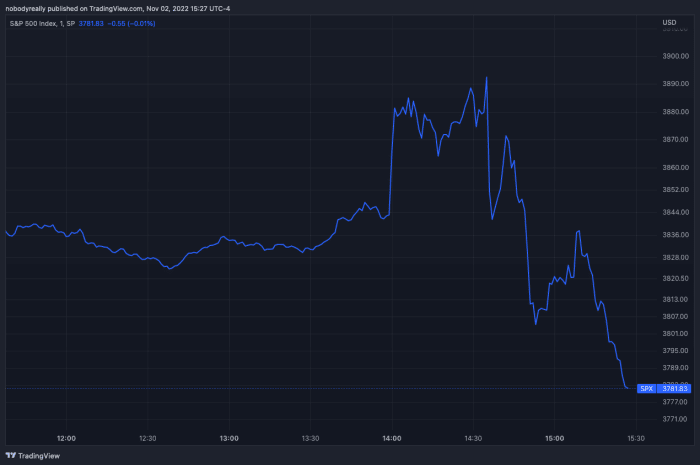[ad_1]
The Federal Open Markets Committee, the U.S. central bank’s body responsible for setting monetary policy, raised interest rates by 75 basis points on Wednesday for the fourth consecutive time as Federal Reserve governors attempt to battle stubborn inflation levels in the country.
Jerome Powell, Chairman of the Federal Reserve and the FOMC, joined a group of journalists for a press conference shortly after the data release, shedding more light on the central bank’s thoughts for future action.
Markets reacted positively to the 0.75% interest rate increase, which came in as expected, but trading became more volatile as the chairman started its speech. While the written statement announcing the interest rate decision showed a new dovish sentence, further fueling the rally, Powell’s press conference combated that feeling as the Fed Chair reiterated previous guidance.
“In determining the pace of future increases in the target range, the Committee will take into account the cumulative tightening of monetary policy, the lags with which monetary policy affects economic activity and inflation, and economic and financial developments,” the FOMC statement read, hinting at a more dovish Fed.
Powell, however, highlighted that the “ultimate level of rates will be higher than previously expected,” triggering an acute market drawdown.
The feeling markets are left with is of confirmation that a slow-down is near but surprise when it comes to the terminal funds rate, something that can be attested by the upswing and consequent downswing in the S&P 500 index.

The S&P 500 shoot up at 14:00 EST (2 p.m.) as soon as the FOMC statement was released with the more dovish language, only to come back down as Powell’s press conference began thirty minutes later. Investors likely left the livestream with a sour taste in their mouths, judging by the continued drawdowns in the index. (Chart/TradingView)
Bitcoin mirrored stock market moves, albeit falling less in percentage terms. At the time of writing, BTC is accumulating a 1% drawdown, while the S&P 500 ended the trading day bleeding by over double that amount (2.39%). The Nasdaq was seeing a similar fate, but extended its losses to 3.15%.
The fact that Bitcoin has been the least volatile of the three is quite remarkable as it defies history and mainstream media narratives altogether. While the peer-to-peer currency is still correlated with stocks, it isn’t the one doing the most severe swings, and that is going by unnoticed.
[ad_2]
Source link
